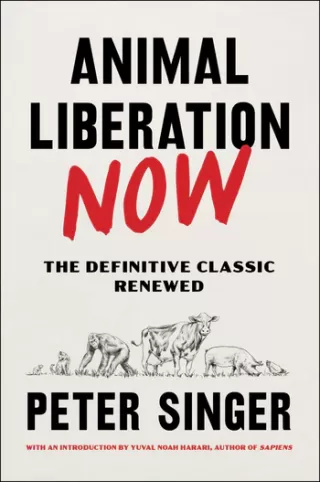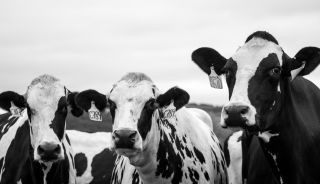Ethics and Morality
Peter Singer's Classic 'Animal Liberation' Fully Renewed
Singer is among the most influential and controversial living philosophers.
Posted May 14, 2023 Reviewed by Jessica Schrader
Key points
- A full revision of Peter Singer's classic book "Animal Liberation" will be released soon.
- The book's overall message is that in our treatment of animals, we are speciesists; this cannot be justified.
- According to Singer, evidence is growing for the cognitive capacities of many species of nonhuman animals.

When I first learned that a thorough revision of Peter Singer's classic book Animal Liberation was going to be published in May 2023 with the title Animal Liberation Now, I couldn't wait to get my hands on it. On that very day, Singer contacted me and asked if I could ask Jane Goodall to write an endorsement—she did—and also asked me to do the same. I was flattered.
It's an understatement to say that the original version of his book was globally influential, and for me, it helped me make a career-changing decision to establish a more egalitarian biology. Singer's updated edition is even more valuable because given what we've learned about animal minds in recent years, it is painfully clear that animals are not disposable, simple-minded, unfeeling objects. We should have got rid of that human-centric arrogance decades ago.
I'm thrilled that Singer could find the time to answer a few questions about Animal Liberation Now.
Marc Bekoff: Why did you renew Animal Liberation and write Animal Liberation Now?
Peter Singer: Animal Liberation was first published in 1975. I revised for a second edition in 1990, but that, except for a new preface and afterword, is the edition that has remained on sale for the past 33 years. The book’s two longest chapters—together, they make up almost half the book—describe the use of animals in research, and factory farming, and they have become badly dated, because a lot has changed in those areas. In addition, though I write about the importance of avoiding meat and other animal products, I barely mention climate change, because it wasn’t such a pressing issue in 1990. China hardly gets mentioned either, because then it was not a major player either in factory farming or research using animals. That’s changed dramatically. I wrote Animal Liberation Now so that the book would show the world that the problem of what we are doing to animals has not gone away. Far from it, in fact—globally, it has got worse.
MB: How does your book relate to your background and general areas of interest? Have these changed over the years?
PS: My background is in philosophy, and within that field, my area of interest is ethics, especially practical or applied ethics. That hasn’t changed over the past 50 years. The publication of Animal Liberation made our treatment of hundreds of billions of animals each year an issue that is discussed in ethics courses all over the world, so that’s how the book draws on my background.
MB: Who is your intended audience?
PS: I’ve written Animal Liberation Now in a style that is accessible to every educated reader, because I’m looking for the broadest possible audience. My fellow-philosophers and teachers will, I hope, find some new points in the book to discuss, but I’m not writing primarily for them.
MB: What are some of the topics you weave into your book and what are some of your major messages?
PS: The overall message of my book is that in our treatment of animals, we are speciesists, which means that our attitude to animals is similar to—and ethically, on a par with—the attitudes of the most blatant racists to the races they regard as inferior, and to the most blatant male sexists to women. In each case, those with the power to exploit and oppress a less powerful group draw a boundary around their own group, and deny equal consideration to the group they exploit. I argue that this cannot be justified. We should give just as much weight to the pain and suffering of a nonhuman animal as we give to the pain and suffering of a human being.

I support this view in the first chapter of the book, where I also examine the evidence that nonhuman animals—especially vertebrates, but some invertebrates too—can feel pain. Much of this evidence, especially with regard to fish, did not exist when I wrote the first edition. Then in the second and third chapters I show how our treatment of animals used in research, and also of those we confine in factory farms and raise for their meat, milk or eggs, treats animals as mere tools or commodities, with little attention paid to their well-being. In the fourth chapter I ask what we can do about this, focusing especially on the benefits—for animals, for the climate, and for public health—of reducing or avoiding entirely the consumption of animal products. In the last two chapters I take a look back at how we got to where we are today, answer some objections, and describe the progress made since Animal Liberation was first published. Finally, I conclude the book with some of my favorite, easy to make, vegan recipes.
MB: How does your book differ from others that are concerned with some of the same general topics?
PS: Animal Liberation has been credited with triggering the modern animal rights movement. Before it, there were no systematic, philosophically rigorous books arguing for a radical change in our thinking, and our actions, regarding animals. That made it unique, and Animal Liberation Now is therefore, as a revised and updated version of a unique book, also unique.
It is true, of course, that in the nearly half a century since Animal Liberation was first published, many philosophers, including Tom Regan, Carol Adams, James Rachels, David DeGrazia, Lori Gruen, Christine Korsgaard, and, most recently, Martha Nussbaum, have followed up with their own ethical arguments for changing the way we treat animals. I welcome all of these books, but I believe the combination of a strong and yet very simple ethical framework with up-to-date and carefully documented factual accounts of what we are doing to tens of billions of animals means that, even in this excellent company, Animal Liberation Now is unique.
MB: Are you hopeful that as people learn more about advances in the study of animal cognition and animal emotions and sentience they will treat them with more respect?
PS: That’s already happening. As I mentioned above, we know a lot more than we did in 1975 about the cognitive capacities and the rich emotional lives of many species of nonhuman animals. That body of evidence makes the case for elevating their moral status even stronger than it was 50 years ago, when I first started writing about animals.
References
In conversation with Peter Singer. Singer has been described as the world’s most influential philosopher. Born in Melbourne in 1946, he has been professor of bioethics at Princeton University since 1999. His many books include Animal Liberation—often credited with triggering the modern animal rights movement - Practical Ethics, The Life You Can Save, The Most Good You Can Do, and Ethics in the Real World. .Singer’s writings have also inspired the movement known as effective altruism, and he is the founder of the charity The Life You Can Save. In 2021 he was awarded the $1 million Berggruen Prize for Philosophy and Culture, which he donated to nonprofit organizations working for the causes he supports. In 2023 he received the Frontiers of Knowledge Prize for the Humanities, from the Spanish BBVA Foundation.
To celebrate the publication of Animal Liberation Now, Peter Singer will be speaking in person, in New York, Washington DC, Los Angeles, San Francisco, London, and in Australia, Perth and Adelaide. For further details, see www.thinkinc.live/singer. Readers of this blog will receive a 50% discount if they use the code SINGER50.




